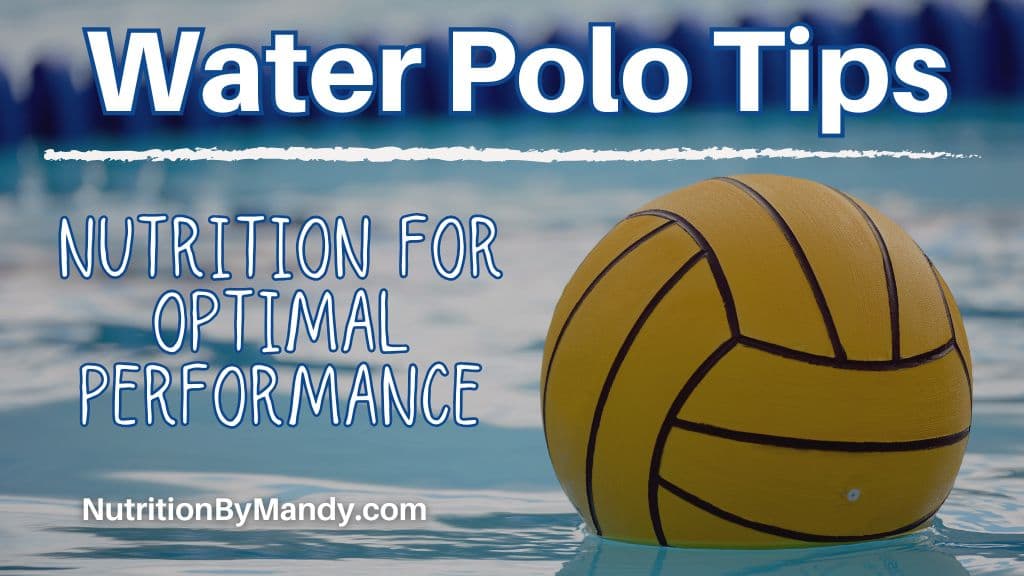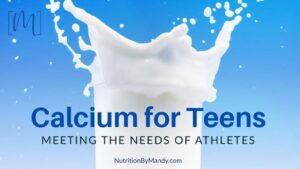Last Updated on September 21, 2025 by Mandy Tyler, M.Ed., RD, CSSD, LD
Water Polo Tips: Nutrition for Optimal Performance
Looking to take your water polo game to the next level? Check out these water polo tips designed to help ensure that athletes are fueled for optimal performance.
Water Polo Tips for Training and Competition
Water polo is a physically demanding team sport. To excel in the pool, swimmers need strength, power, endurance, speed, and agility (1).
The sport involves high-intensity, bursts of activity along with longer periods of lower-intensity activity in which players continually tread water (2).
The game also involves aggressive physical contact as well as technical skill and ball control (1). Given the physiological requirements of the sport, having a nutrition plan in place can help ensure water polo players have the energy needed for training and peak performance.

Water Polo Tips: Nutrition for Training and Competitions
The foundation of a water polo player’s daily diet should be carbohydrates. Carbohydrates provide athletes with the energy needed to train and compete at their best.
Eating a diet high in carbohydrates is particularly important to fuel intense water polo practices and two-a-day workouts. Swimmers who under consume carbohydrates may struggle to complete high-quality workouts and training sessions (1).
Easy ways for athletes to add carbohydrates to their meals and snacks include:
- Grains: Bread, pasta, rice, cereal, oatmeal
- Fruit: Fresh, dried, frozen, canned in natural juices, applesauce
- Starchy vegetables: Potatoes, sweet potatoes, corns, beans, peas, winter squash
- Dairy: Milk and yogurt
Water Polo Tips: Pre-Match Nutrition
It is important for water polo players to go into their games well-fueled.
When possible, water polo players should eat their pre-game meal 3-4 hours prior to the start of their match. This allows time to digest, as well as for athletes to go to the bathroom before the start of the match if needed.
The meal should be high in carbohydrates and contain a moderate amount of protein. I like to encourage athletes to fill half of their pre-game plate with carbohydrate-rich food items.
Some of my top choices for pre-game meals include:
- Pancakes, scrambled eggs, fresh sliced fruit
- Fruit smoothie, bagel with nut butter and honey
- Turkey sub sandwich, pretzels, Greek yogurt and berries parfait
- Grilled chicken wrap, fresh fruit cup, granola bars
- Pasta with marinara, sliced chicken, vegetables, breadsticks
- Grilled salmon, steamed rice, green beans, sliced melon, dinner rolls
Pro Tip: When competing in tournaments it is especially important for water polo players to start the competition well-fueled (1). In addition, they should have a plan in place for refueling between games.

Pre-Match Snacks for Water Polo
In the 1-2 hours leading up to the match, water polo players can continue fueling with easy-to-digest high-carb snacks. The carbohydrates will provide athletes with a quick source of energy as they head into their game.
Easy pre-game snack ideas for water polo players include:
- Applesauce squeeze pouch
- Banana, small piece of fresh fruit
- Dried fruit, fruit leather
- Low-fat granola bar, fig bar, cereal bar
- Pretzels, pita chips, snack crackers
Water Polo Tips: Post-Match Nutrition
Following a water polo match, athletes should focus on rehydrating and refueling to support their recovery nutrition needs.
Recovery nutrition is particularly important for water polo players when they have limited time between matches (1). I frequently tell athletes to make recovery nutrition a priority when they have <24 hours between workouts or competitions.
Recovery Nutrition for Water Polo Players
The three key areas that water polo players should focus on to support their recovery nutrition needs include:
- Rehydrate: Consume fluid and electrolytes to replace sweat losses
- Refuel: Consume carbohydrates to replace energy stores
- Build and Repair: Consume protein to build and repair muscles

Water Polo Tips: Post-Match Snack Ideas
Water polo players should plan ahead and pack healthy snacks in their swim bag that they can enjoy following a match. Having a well-planned snack is particularly important if it will be several hours until their next meal.
Easy post-match snack ideas for water polo players include:
- Granola bars, chocolate milk
- Peanut butter and jelly sandwich, low-fat milk
- Greek yogurt, berries, granola parfait
- Turkey and cheese wrap, tart cherry juice
- Beef jerky, pretzels, sports drink
- Tuna fish, crackers, 100% fruit juice
- Cheese stick, breakfast bars, banana
- Hard-boiled eggs, grapes, fig bars
- Sports bar, sports drink
- Post-workout smoothie
Water polo players can further support their recovery nutrition needs by following-up their post-match snack with a well-balanced meal in the next 2-3 hours (1).
Pro Tip: Make sure to check out my blog on post-game meals for ideas on what to eat after a water polo match.
Water Polo Tips: Hydration
Hydration is important for water polo players. Even minimal dehydration (>2%) can impact an athlete’s strength, power, endurance, and cognitive function (3). Therefore, maintaining hydration is critical for optimal sports performance.
Even though water polo is played in the water, athletes still sweat to dissipate heat from their bodies. Since water polo players are less likely to notice sweat losses in the pool, having a hydration plan in place for activity is important.
Note: When games are played in warmer water, such as in an outdoor pool or a humid indoor pool area, athlete sweat losses will be higher (1). Water polo players should be particularly mindful of their hydration needs in these situations.

Hydration Tips for Water Polo Players
Despite the importance of hydration, many athletes enter their workouts in a dehydrated state (3).
Easy tips to help water polo players stay on top of their hydration needs throughout the day include:
- Start the day with a glass of water
- Carry a refillable water bottle during the day as a reminder to hydrate
- Enjoy nutritious beverages with meals and snacks, such as water, low-fat milk, or 100% fruit juice
- Eat a variety of fruits and vegetables that contain a high-water content, such as watermelon, strawberries, oranges, cucumbers, tomatoes, and celery
Hydrating During Water Polo Practices
During water polo practices, athletes should take advantage of each water break to hydrate. During activity, a general goal is to aim to drink ~3-8 ounces of fluid every 15-20 minutes (0.4-0.8 L per hour) of activity (4, 5).
To make this easier for athletes, drinking a big gulp of water or a sports drink is equivalent to approximately 1 ounce of fluid.
Thus, water polo players should aim to drink several big gulps from their water bottle every 15-20 minutes of practice or each water break the team gets.
Hydrating During Water Polo Games
During a game situation, athletes should prioritize the breaks between quarters to hydrate.
Drinking several large gulps of a sports drink during the break will help players rehydrate with both fluid and electrolytes. The carbohydrates in the sports drink will also provide players with a quick source of energy for the next quarter.
In addition to refueling the muscles, the carbohydrates provide energy for the brain. Keeping the brain optimally fueled helps support attention and decision making, which can be key down the home stretch of the game (1).
Pro Tip: If a player chooses to hydrate with water during the break, consider refueling with carbohydrates from another source such as a gel or chews (1).
Water Polo Tips: Injury Prevention
The physical nature of water polo, which involves swimming, wrestling, and overhead throwing, places athletes at an increased risk of injury. Water polo players are susceptible to injuries resulting from physical contact (i.e., concussions, eye injuries, fractures) as well as overuse injuries (6, 7).
The shoulder is the most common area of overuse injury, resulting from repetitive overhead throwing. In addition, water polo players are throwing from the water without a fixed base of support, which causes additional strain on the shoulders (6).
Thus, it can be of benefit for water polo players to work with their strength coach or athletic trainer on a sport-specific strengthening program to help prevent overuse injuries (6).
Nutrition Tips for Injury Prevention
It is important for water polo players to consume adequate calories to support both their health and training needs. Underfueling can have negative health impacts on an athlete’s health as well as adversely affect sports performance (8).
Therefore, it is a top priority to ensure water polo players are consuming adequate daily calories In their meals and snacks.
In addition, building lean muscle mass can be a competitive benefit for water polo players, as it provides them with a physical advantage in the pool (1, 6). Water polo players should ensure they are consuming an adequate amount of protein in the daily diet to support the building and maintenance of muscle mass.
Finally, I encourage water polo players to include a variety of foods in their meal plan that can help reduce inflammation in the body and enhance recovery.
Some of my top anti-inflammatory food choices include:
- Berries and cherries
- Dark green leafy vegetables
- Fatty fish: Salmon, tuna, mackerel, herring, and sardines
- Nuts: Walnuts, almonds, pistachios
- Seeds: Chia seeds, flaxseeds
- Herbs and spices: Turmeric, ginger, garlic, rosemary
Pro Tip: If an injury does occur, make sure to check out my blogs on the best food for concussions as well as nutrition for bone healing.

Water Polo Tips: Nutrition for Optimal Performance
You are now set with a variety of nutrition tips for water polo players to fuel optimal performance.
For additional sports nutrition tips for swimmers, make sure to check out my blog on the best snacks for swim meets.
Join the Nutrition By Mandy Email List & Get a Free Athlete’s Grocery List
Click HERE to join the Nutrition By Mandy e-mail list. When you join you will receive a free athlete’s grocery list to print and take with you to the store.
About the Author
Mandy Tyler is a Sports Dietitian Nutritionist in the San Antonio, TX area. She is a Registered and Licensed Dietitian, a Board-Certified Specialist in Sports Dietetics, a Licensed Athletic Trainer, and is a Certified Exercise Physiologist through the American College of Sports Medicine. Mandy has experience working with athletes at the high school, collegiate, and professional levels. She believes the key to reaching one’s full potential, both in everyday life and in sports performance, relies on a healthy nutritional foundation.

If you are looking to take your performance to the next level, make sure to check out my new Sports Nutrition Game Day Guide. This downloadable guide is written to help athletes develop an individualized plan to achieve peak performance on game day.





